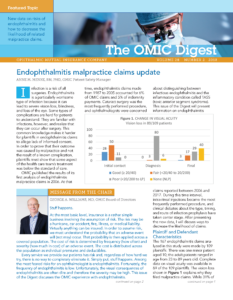
Risk Management
| << Back |
Endophthalmitis education for patients
ANNE M MENKE, RN, PhD, OMIC Patient Safety Manager
A number of plaintiffs who filed a claim against OMIC insureds after developing endophthalmitis inadvertently delayed their own diagnosis and treatment. They either did not report symptoms or chose to delay seeing a retinal specialist. Delay in initiating treatment can lead to a worse outcome. Our experts reviewing such claims try to determine whether the defendant could have handled the situation better.
Q. We provide each patient instructions on when to call us after surgery. My patient did not follow these instructions. What could I have done differently?
A. Plain-language experts feel that patients need to see the most important information first. They are most likely to read key instructions that are placed at the beginning of the document. The instructions need to be short, simple, and clear. The printed documents from your EHR may not be easy for patients to read, and the information they need the most may be hard to find. Instead, use a short document that starts like this: “Patients can have problems after eye surgery (or an eye injection). We need your help to watch for them. Please call our office right away if you have these problems: 1) Pain that is getting worse, or 2) Vision that is getting worse.” You can provide information about the normal postoperative course and the time of the follow-up appointment after you have discussed vision-threatening symptoms that need to be reported to you. As an alternative, some ophthalmologists send short post-procedure instructions via text to patients who choose to receive them; and encourage the patients to text back questions or concerns.
Q. My patient called to report pain after cataract surgery. I wanted her to go see a retina specialist right away, but there is no specialist in our town. She was not willing to drive one hour to be examined at the academic center. When she sued me, she said I never told her she needed urgent care. How could I have explained this better?
A. Providing care over the telephone is challenging. Obtaining “informed refusal” this way is even more difficult. When patients indicate that they will not follow your medical advice, you need to take steps to ensure that they understand the possible consequences. You might say something like this: “Mrs. Harrison, I understand that your husband does not want to drive for one hour in the dark. I am very worried about your eye. You could have a serious infection. If the infection is not treated right away, you could lose vision. You might even go blind in that eye.” To confirm that patients understand your warning, ask them to repeat it back to you: “I want to make sure that I have explained why I am worried. Could you please tell me what might happen if you don’t get care right away?” You might also ask if an adult child, neighbor, or volunteer from a local organization could drive the patient to the appointment. Be sure to document the conversation as soon as possible.
Q. I heard that during the informed consent discussion, I should point out complications for which the patient is at increased risk? Is that true?
A. Yes. Such a discussion might have helped patients in the study who had poorly controlled diabetes mellitus or were taking immunosuppressant medications. You might counsel a patient this way: “I want to talk to you about how your cancer treatment might affect you after your eye surgery. Surgery can cause infection. Your cancer treatment will make it harder for your body to fight an infection. So it’s important that you call me right away if you have any problems after surgery. Here is the list of problems I want to know about.”
Please refer to OMIC's Copyright and Disclaimer regarding the contents on this website






